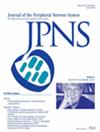Pain hypersensitivity, sensorimotor impairment, and decreased muscle force in a novel rat model of radiation-induced peripheral neuropathy
Abstract
Introduction
Radiation-induced peripheral neuropathy is a rare, but serious complication often resulting in profound morbidity, life-long disability, and chronic debilitating pain. Unfortunately, this type of peripheral neuropathy is usually progressive, and almost always irreversible. To date, a standardized rat model of radiation-induced peripheral neuropathy has not been established. The purpose of the present study was to examine neuropathic pain, sensorimotor impairment, and muscle force parameters following the administration of a clinically relevant radiation dose in a rat model.
Methods
Ten rats were randomly assigned to one of two experimental groups: (1) radiation and (2) sham-radiated controls. Radiated animals were given a clinically relevant dose of 35 Gray (Gy) divided into five daily doses of 7 Gy/day. This regimen represents a human equivalent dose of 70 Gy, approximating the same dosage utilized for radiotherapy in oncologic patients. Sham-radiated controls were anesthetized and placed in the radiation apparatus but were not given radiation. All animals were tested for baseline values in both sensorimotor and pain behavioral tests. Sensorimotor testing consisted of the evaluation of walking tracks with the calculation of the Sciatic Functional Index (SFI). Pain-related behavioral measures consisted of mechanical allodynia (von Frey test), cold allodynia (Acetone test), and thermal allodynia (Hargreaves test). Animals were tested serially over an 8-week period. At the study endpoint, electrophysiological and muscle force assessments were completed, and histomorphometric analysis was performed on all sciatic nerves.
Results
Animals that underwent radiation treatment displayed significantly greater pain hypersensitivity to mechanical stimulation as compared to sham radiated controls from weeks 4 to 8 of testing. SFI values indicated sensorimotor impairments in the overground gait of radiated animals as compared to non-radiated animals. Furthermore, radiated animals displayed reduced twitch and tetanic muscle force when compared to sham radiated controls.
Conclusions
A clinically relevant human equivalent dose of fractionated 35 Gy in rats established significant pain hypersensitivity, impairments in sensorimotor locomotion, and decreased muscle force capacity. This novel rodent model of radiation-induced peripheral neuropathy can be utilized to assess the potential efficacy of therapeutic treatments to either prevent or remediate this clinically debilitating condition.


 求助内容:
求助内容: 应助结果提醒方式:
应助结果提醒方式:


